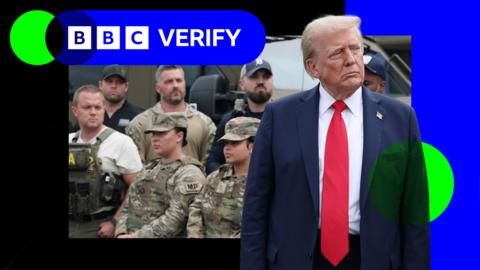Alongside the taxis waiting outside Union Station in Washington DC, the sight of uniformed troops standing next to armoured military vehicles has been greeting passengers getting off their trains.
It is a striking symbol of President Trump's efforts to tackle a crime emergency in the US capital, which has seen his administration take over its police department and send National Guard troops, FBI and ICE agents onto the streets.
Trump says his crime crackdown, which began on 11 August, has had an immediate effect: The numbers are down like we wouldn't believe, but we believe it. And he has claimed that it has led to an extended period of time without any murders, a trend he says has not been seen in the city in decades. So what do the crime figures show?
Violent crime has fallen
There has been a significant fall in overall violent crime since the crackdown started, according to Washington's Metropolitan Police Department (MPD). It recorded 75 violent crimes from 12-26 August, a drop of 23% on the previous two weeks. Property crimes, such as burglary and vehicle theft, fell by about a quarter over the same period.
US crime analyst Jeff Asher points to the complications in interpreting crime reports, noting that reporting always lags and that some of the reported decline may be artificially embellished. You probably need six weeks or so for incident-based reporting to catch up and make a comparison of the most recent period, he stated.
More than 1,000 people arrested
U.S. Attorney General Pam Bondi has reported an alarming tally of over 1,000 arrests since the beginning of the crime crackdown. As of August 25, the MPD noted 1,048 arrests made since August 11, including serious offenses linked to immigration violations.
Judge Zia M. Faruqui expressed concerns over the strain on the court system, attributing it to the rise in federal prosecutions resulting from the surge in arrests and stating that the system was not keeping pace with the increased workload.
What about murders?
While Trump touted weeks without a homicide, historical data indicates that such periods have occurred previously. His claims, while factually correct for the timeframe, do not constitute an unprecedented change in crime statistics.
As the surge in arrests continues, the ramifications of Trump's strategy are poised to initiate broader discussions about policing, civil rights, and systemic challenges in the justice system.






















